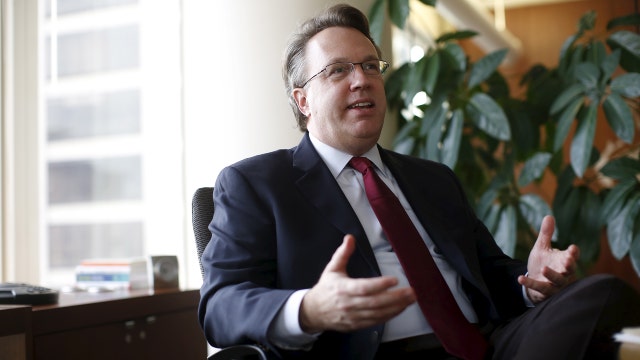Fed’s Williams: Global Risks are ‘Pretty Well Balanced’
The Federal Reserve has backed off its December forecast of raising rates as many as four times in 2016, but San Francisco Fed President John Williams said the U.S. economy could soon be ready for higher rates.
“I think there’s some pretty strong upside potential for growth this year, and actually inflation. So, my own view is that [global risks] are pretty balanced, but I take it seriously that we have to pay close attention,” Williams said Thursday in an exclusive interview with FOX Business Network’s Peter Barnes.
The U.S. central bank hiked short-term interest rates for the first time in nearly a decade back in December, and outlined what’s become an ambitious outlook for future rate rises by the end of 2016. The Fed opted to keep rates on hold at both its January and March meetings, citing global headwinds and jitters in financial markets across the world.
Minutes released from the March meeting of the policy-setting Federal Open Market Committee showed central bankers continued to fret about how a slowdown in global growth prospects and negative interest rate policy in many regions including Europe and Asia would affect the U.S. economy.
The minutes also appeared to show a range of opinions from FOMC members about when the economy would be stable enough to withstand higher rates. Some members favored the opportunity to raise rates at the April meeting as recent economic data – including inflation and employment figures – have shown continued improvement. Still, other members expressed a view that caution should be exercised this month.
Williams acknowledged the division among members, but said, in his view the Fed could raise rates two or more times before the year is up. Markets, though, aren’t as convinced. Fed funds futures, which express the market’s view on the likelihood of change in monetary policy, have the odds of a rate rise at the December meeting at 54%.
Further, Williams said chatter about a looming recession are, essentially, unfounded.
“There was a lot of talk earlier this year about a recession in the U.S. or globally, and I actually don’t’ think there was any real support for that or any indications whatsoever that we were at a higher risk for recession,” he said.
He continued by reiterating Fed Chief Janet Yellen’s repeated view that gradual tightening of U.S. monetary policy would be warranted as global growth improves.
The biggest threat to that outlook, though, he said was China and its pivot away from a manufacturing and export-driven economy, to one focused on domestic demand, services and consumer spending.
“To my mind it’s more of a subtle story. It’s not about a hard landing or the slowdown. It’s really about the structural change that’s happening in China, which is having repercussions around the globe,” he said.
Williams added that the U.S., though, is “weathering the storm” and proving to be “quite resilient” in the face of persisting global uncertainty.




















